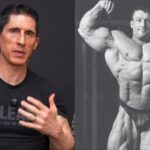Bodybuilding legend Dorian Yates has watched the sport change for better or worse over the years. In a recent interview, he discussed his experiences after taking steroids, changes to the Men’s Open division, and why people starting in fitness should avoid performance-enhancing drugs.
During the 1990s, Dorian Yates rose to power in the IFBB Pro League with an impenetrable back shortly after Lee Haney retired. His mass and dry conditioning ushered in a new era in the Men’s Open. En route to building his exceptional legacy, Yates routinely bested superpowers of the sport like Kevin Levrone, Flex Wheeler, and Shawn Ray.
With six Mr. Olympia titles to his name, Yates remains one of the most successful athletes to don a pair of posing trunks. Given the current Open landscape, Yates pointed out how physiques have changed, highlighting that competitors today lack forearm and calf definition.
Dorian Yates Critical of Today’s Open Class, Gives Advice to People Starting Steroids, Talks Life After Bodybuilding
According to Yates, the Men’s Open Mr. Olympia is ‘not the same.’ He argued that the standards have changed, revealing that all the top competitors are missing calves and forearms.
“The competition, are you talking about Open Mr. Olympia? It’s not the same. It’s not the same standard at all. I don’t think,” said Yates.
“It’s conditioning and I think when people ask me what’s the change in the competitors why are they now all the guys are very short? All the guys don’t have calves, and they don’t have forearms, and all this stuff.
He doesn’t understand why modern athletes aren’t living up to the standards of their predecessors. Yates says there are far more competitors in bodybuilding now whereas in his day, less talent existed.
“I’m like, well, if you had 10 million people doing something or one million people doing something… you’ll have more outstanding genetic specimens in the 10 million than you would in the one million. Although, much more people are going to the gym than they were let’s say in the 90s when I was Mr. Olympia. More people going to the gym, more gyms, everything, but less people doing bodybuilding.”
“In the 80s and the 90s, every dude wanted to be a bodybuilder. That was it. If you went to the gym you wanted to be a bodybuilder and you probably wanted to try competing as well. It was all quite new, everyone was into it, now there’s so many different avenues you can go down with fitness and so many different categories in all the competitions.”
Yates underlines that taking steroids is an individual journey and that it’s not worth pursuing for people unless they plan to compete in bodybuilding.
“I tell people, when you start out–if you start out, if you make that decision and that’s an individual one, personally, knowing everything that I know, I don’t think it’s worth taking steroids unless you’re like you want to compete or something. It’s something you should look into seriously.”
For anyone trying steroids for the first time, Yates says to expect to put on approximately 20 pounds.
“The first course that anyone does, it doesn’t matter what it is, 15-20 milligrams of Dbol, a shot of Deca, whatever it is, your first course, you’re putting on 20 pounds in a couple of months. That’s just–you speak to people, that’s the average.”
He does acknowledge that the stronger and bigger someone gets, they might eventually surpass what can be achieved naturally, which he described as a ‘cutoff point.’
“It’s up to everybody what they do, but once you get on this journey and you get bigger and you get stronger and you surpass what you could do without steroids because there is kind of a I call it a cutoff point, when you’re training naturally you’ll get to a point where you can’t recover anymore. There’s a ceiling which you take away by using steroids and you get up to another level but that’s really temporary in nature.”
After his experiences with steroids and bodybuilding, Yates admits he suffered from an identity crisis.
“This was part of the whole crisis that I went through literally. Who am I? Who am I? Am I this guy, it’s like an image I’m living here, Mr. Olympia. So I had to go through all that and kind of find out who I was without all that because it becomes like a security thing.”
Since his days on stage, health has become Yates’ number one priority, which is why he lost weight with a plant-based diet.
“This is who I am, this is what I’m good at, this is where I’m comfortable. So I’ll just stay there. But, I knew there’s more things to my life, more things to do, and more challenges and that was one of the challenges. I was keeping fairly 250-260-something cruising along there.
I went for a checkup I noticed my blood pressure was going up. You know what I’m going to do here? I’m just going to lose weight and I’m not fat anyway. I went on a plant-based diet, 70 grams of protein a day,” Dorian Yates shared.
As one of the most accomplished Mr. Olympias in the sport, Yates has been an open book in retirement. He believes people are hampering their workout progress by bringing a phone to the gym. He also shined a light on the low testosterone epidemic among young men recently.
Although competitors’ physiques have changed dramatically since his time on stage, Yates continues to watch over the sport with a close eye. Most importantly, he believes unless you plan on competing, it’s best to steer clear of performance-enhancing drugs.
Watch the full video from the Dorian Yates Nutrition YouTube channel below:
Tip: If you're signed in to Google, tap Follow.









